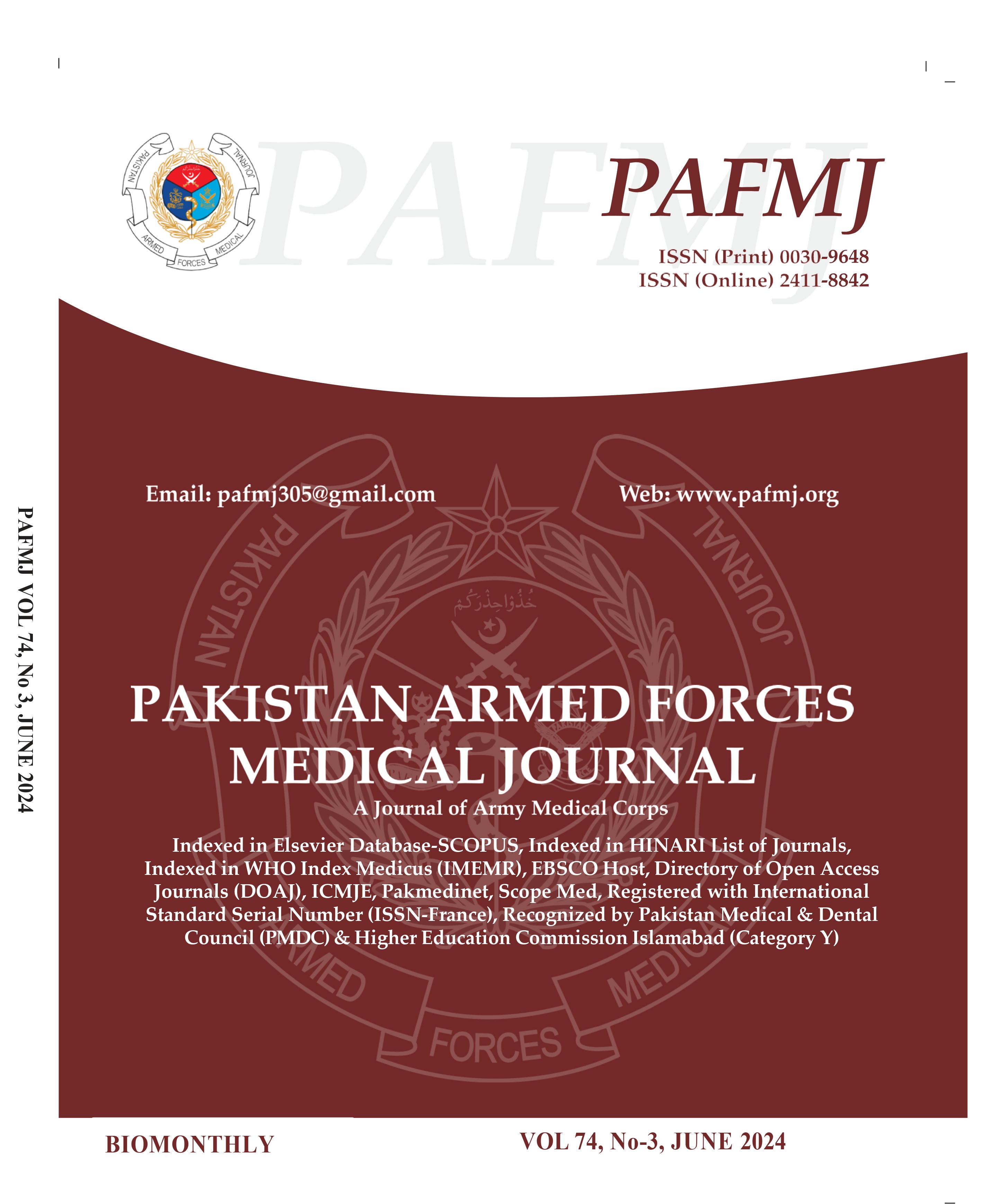Health Professionals Attitude, Knowledge and Practices towards COVID-19 Infection at Karachi, Pakistan
DOI:
https://doi.org/10.51253/pafmj.v74i3.5901Keywords:
Attitude, COVID-19, Health professional, Knowledge, Practices.Abstract
Objective: To evaluate the health professional’s knowledge, attitude, and practices towards the COVID-19 pandemic in Karachi, Pakistan.
Study Design: Cross-sectional study.
Place and Duration of Study: Karachi Pakistan, from Mar to Jul 2020.
Methodology: A total of 228 healthcare professionals, i.e. specialists, physicians, nurses, and technicians working in the district East of Karachi were included. Independent sample t test and ANOVA were used for inferential statistics.
Results: Our findings showed that 95% study participants had a good knowledge regarding the infection and 81.8% showed a positive attitude towards the infection with over 98% reporting good professional practices regarding COVID-19 infection control.
Conclusion: These findings underscore the effectiveness of ongoing education and training initiatives among health professionals in Karachi, contributing to their preparedness and ability to effectively respond to the challenges posed by the COVID-19 pandemic.
Downloads
References
Xu X-W, Wu X-X, Jiang X-G, Xu K-J, Ying L-J, Ma C-L, et al. Clinical findings in a group of patients infected with the 2019 novel coronavirus (SARS-Cov-2) outside of Wuhan, China: retrospective case series. BMJ 2020: 368: m606.
https://doi.org/10.1136/bmj.m606
Burke RM. Active monitoring of persons exposed to patients with confirmed COVID-19—United States, January–February 2020. MMWR Morb Mortal Wkly Rep 2020; 69(9): 245-246.
https://doi.org/10.15585/mmwr.mm6909e1
Joukar F, Mansour-Ghanaei F, Soati F, Meskinkhoda P. Knowledge levels and attitudes of health care professionals toward patients with hepatitis C infection. World J Gastroenterol 2012; 18(18): 2238-2244.
https://doi.org/10.3748/wjg.v18.i18.2238
Nour MO, Babilghith AO, Natto HA, Al-Amin FO, Alawneh SM. Knowledge, attitude and practices of healthcare providers towards MERS-CoV infection at Makkah hospitals, KSA. Int Res J Med Med Sci 2015; 3(4): 103-112.
https://doi.org/10.14303/irjmms.2015.103
Khan MU, Shah S, Ahmad A, Fatokun O. Knowledge and attitude of healthcare workers about middle east respiratory syndrome in multispecialty hospitals of Qassim, Saudi Arabia. BMC Public Health 2014; 14(1): 1–7.
https://doi.org/10.1186/1471-2458-14-1281
Ajzen I, Fishbein M. Attitude-behavior relations: A theoretical analysis and review of empirical research. Psychol Bull 1977; 84(5): 888. https://doi.org/10.1037/0033-2909.84.5.888
Bevova MR, Netesov SV, Aulchenko YS. The new coronavirus COVID-19 infection. Mol Gen Microbiol Virol 2020; 35(2): 53-60.
https://doi.org/10.3103/S0891416820020044
Biamonte F, Botta C, Mazzitelli M, Rotundo S, Trecarichi EM, Foti D, et al. Combined lymphocyte/monocyte count, D-dimer and iron status predict COVID-19 course and outcome in a long-term care facility. J Transl Med 2021; 19(1): 79.
https://doi.org/10.1186/s12967-021-02744-2
ElHawary H, Salimi A, Diab N, Smith L. Bibliometric analysis of early COVID-19 research: the top 50 cited papers. Infect Dis 2020: 13: 1178633720962935.
https://doi.org/10.1177/1178633720962935
Grasselli G, Greco M, Zanella A, Albano G, Antonelli M, Bellani G, et al. Risk factors associated with mortality among patients with COVID-19 in intensive care units in Lombardy, Italy. JAMA Intern Med 2020; 180(10): 1345-1355.
https://doi.org/10.1001/jamainternmed.2020.3539
Hosoki K, Chakraborty A, Sur S. Molecular mechanisms and epidemiology of COVID-19 from an allergist’s perspective. J Allergy Clin Immunol 2020; 146: 285–299.
https://doi.org/10.1016/j.jaci.2020.05.003
Iwasaki M, Saito J, Zhao H, Sakamoto A, Hirota K, Ma D. et al. Inflammation triggered by SARS-CoV-2 and ACE2 augment drives multiple organ failure of severe COVID-19: Molecular mechanisms and implications. Inflamm Res 2020; 44: 13–34.
https://doi.org/10.1007/s00011-020-01324-5
Buonacera A, Stancanelli B, Colaci M, Malatino L. Neutrophil to lymphocyte ratio: an emerging marker of the relationships
between the immune system and diseases. Int J Mol Sci 2022; 23(7): 3636. https://doi.org/10.3390/ijms23073636
Grasselli G, Scaravilli V, Mangioni D, Scudeller L, Alagna L, Bar-toletti M, et al. Hospital-acquired infections in critically ill patients with COVID-19. Chest 2021; 160(2): 454-465.
https://doi.org/10.1016/j.chest.2021.04.002
Loss S, Nunes DL, Franzosi OS, Teixeira C. A pragmatic app-roach and treatment of coronavirus disease 2019 (COVID-19) in intensive care unit. Rev Assoc Med Bras 2020; 66(8): 1157–1163. https://doi.org/10.1590/1806-9282.66.8.1157
Maréchal M, Morand P, Epaulard O, Némoz B. COVID-19 in clinical practice: A narrative synthesis. Med Mal Infect 2020; 50: 639–647. https://doi.org/10.1016/j.medmal.2020.09.012
Peng M. Outbreak of COVID-19: An emerging global pandemic threat. Biomed Pharmacother 2020; 129: 110499.
https://doi.org/10.1016/j.biopha.2020.110499
Qureshi NA, Habeeb AAA. COVID-19 pandemic: Scoping review through the lens of 9-month-based knowledge and brief snapshots of 10 cases and five family units, Riyadh, Saudi Arabia. Int Neuropsychiatr Dis J 2020; 14–47.
Downloads
Published
Issue
Section
License
Copyright (c) 2024 Muhammad Rahies Khan, Mubashir Ali Khan, Muhammad Nadir Khan

This work is licensed under a Creative Commons Attribution-NonCommercial 4.0 International License.















